Janice Hardy's Blog, page 20
July 6, 2021
Speaking Without Freaking: A Writer’s Guide
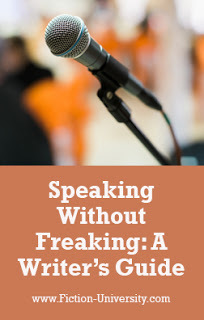 By Ann Harth, @Annharth
By Ann Harth, @Annharth
Part of The Writer's Life Series
JH: Speaking in public scares a lot of writers, but it’s a useful promotional tool for authors. Ann Harth spares tips on how to speak in public without freaking out.
Ann Harth writes fiction and non-fiction for children and adults. Strong, interesting female characters creep into many of her books, and many arrive with a sense of humor.
She taught writing for the Australian College of Journalism for eight years before taking the leap into freelance writing and structural editing work.
Ann is the Far North Queensland coordinator for The Society of Children’s Book Writers and Illustrators. She’s had a number of fiction and non-fiction children’s books published in Australia and the UK and over 130 short stories sold internationally.
When not tapping the keys, Ann stuffs a notebook into her pack and searches for remote places to camp, hike or explore.
Website | Goodreads | Facebook | Twitter |
Take it away Ann...
Continue ReadingWritten by Janice Hardy. Fiction-University.com
Published on July 06, 2021 04:48
July 3, 2021
WIP Diagnostic: Is This Working? A Closer Look at Enticing Readers into Your Opening Scene
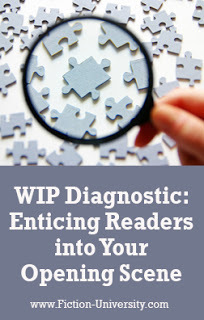 Critique by Maria D'Marco
Critique by Maria D'Marco WIP Diagnostics is a weekly column that studies a snippet of a work in progress for specific issues. Readers are encouraged to send in work with questions, and we diagnose it on the site. It’s part critique, part example, and designed to help the submitter as well as anyone else having a similar problem.
If you're interested in submitting to WIP Diagnostics, please check out these guidelines.
Submissions currently in the queue: Four
Please Note: As of today, critique slots are booked through July 31.
This week’s questions:
1. What are the shortcomings that are in most need of correction?
2. Would this beginning entice the reader enough to continue with the story?
Market/Genre: Short Story
On to the diagnosis…
Continue ReadingWritten by Janice Hardy. Fiction-University.com
Published on July 03, 2021 04:22
July 2, 2021
10 Alternative Types of Short Fiction
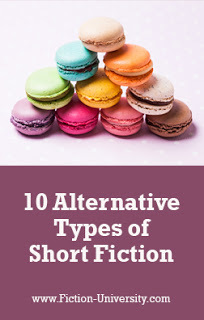 By Rachelle Shaw
By Rachelle ShawPart of the Focus on Short Fiction Series
JH: Not all short fiction is a "short story" as we know it. Rachelle Shaw shares a round-up of different short fiction options and structures.
As outlined in the introductory post for this series, a typical short story follows the kind of structure we’ve all come to know and love when we think of fiction: a tale with a beginning, middle and end. And while they only capture a single event in time, traditional short stories still include an overall plot while fostering growth or change for the characters within them. However, it’s worth noting there are other options in the world of short fiction, particularly if that setup isn’t your cup of tea.
Continue ReadingWritten by Janice Hardy. Fiction-University.com
Published on July 02, 2021 04:00
July 1, 2021
The Whys and Hows of Novel Translations
 By Ariel Tachna
By Ariel Tachna Part of The Writer's Life Series
JH: Translating a novel into other languages can add to an author’s sales. Ariel Tachna answers some common questions about novel translations.
When Ariel Tachna was twelve years old, she discovered two things: the French language and romance novels. Those two loves have defined her ever since. By the time she finished high school, she’d written four novels, none of which anyone would want to read now, featuring a young woman who was—you guessed it—bilingual. That girl was everything Ariel wanted to be at age twelve and wasn’t.
She now lives near Winston-Salem, North Carolina, with her husband (who also speaks French), her kids (who understand French even when they’re too lazy to speak it back), and their two dogs (who steadfastly refuse to answer any French commands). The cat pretends they’re all beneath her, no matter what language they’re speaking.
Website | Facebook |
Take it away Ariel…
Continue ReadingWritten by Janice Hardy. Fiction-University.com
Published on July 01, 2021 03:16
June 29, 2021
If You're Looking for a Critique Group or Partner, Critique Connection is Now Open
By Janice Hardy, @Janice_Hardy
It's Critique Group Time Again! The 2021 Summer Session is now open!
Finding other writers to share work and critiques with isn't always easy, particularly for newer writers who often don't even know where to start looking.
In 2013 I created "Janice Hardy's Critique Connection" to help such writers connect with like-minded folks looking for critique groups or partners. It was designed to help people find long-term, quality writing partners, not just places you can toss up your work and get quick feedback.
It went from a one-time event to annually, and now to every six months (I open it up every January and July).
If you're looking to join or create a critique group, add more to your existing group, or find a critique partner, odds are you'll find someone here.
Continue ReadingWritten by Janice Hardy. Fiction-University.com
It's Critique Group Time Again! The 2021 Summer Session is now open!
Finding other writers to share work and critiques with isn't always easy, particularly for newer writers who often don't even know where to start looking.
In 2013 I created "Janice Hardy's Critique Connection" to help such writers connect with like-minded folks looking for critique groups or partners. It was designed to help people find long-term, quality writing partners, not just places you can toss up your work and get quick feedback.
It went from a one-time event to annually, and now to every six months (I open it up every January and July).
If you're looking to join or create a critique group, add more to your existing group, or find a critique partner, odds are you'll find someone here.
Continue ReadingWritten by Janice Hardy. Fiction-University.com
Published on June 29, 2021 05:32
June 26, 2021
WIP Diagnostic: Is This Working? A Closer Look at Show, Don’t Tell and POV
 Critique by Janice Hardy, @Janice_Hardy
Critique by Janice Hardy, @Janice_HardyWIP Diagnostics is a weekly column that studies a snippet of a work in progress for specific issues. Readers are encouraged to send in work with questions, and we diagnose it on the site. It’s part critique, part example, and designed to help the submitter as well as anyone else having a similar problem.
If you're interested in submitting to WIP Diagnostics, please check out these guidelines.
Submissions currently in the queue: Four
Please Note: As of today, critique slots are booked through July 24.
This week’s questions:
1. Main concern: Is there telling detected that should be deleted or can be corrected? Suggestions?
2. Is there enough at stake?
3. Is the scene grounded enough in description?
4. Is there enough about Malia to make the reader care or sympathize with her?
5. Anything outstanding that could use revising?
Market/Genre: Romantic Suspense
On to the diagnosis…
Continue ReadingWritten by Janice Hardy. Fiction-University.com
Published on June 26, 2021 06:08
June 24, 2021
How to Market Your Book Before It’s Written
 By Jenna Harte
By Jenna Harte
Part of The Writer's Life Series
JH: When should you start marketing your book? Jenna Harte says it’s never too early. Here are ways to market your book while you’re writing it.
Jenna Harte is a die-hard romantic writing about characters who are passionate about and committed to each other, and frequently getting into trouble. She is the author of the Valentine Mysteries, the first of which, Deadly Valentine (free at her website), reached the quarter-finals in Amazon’s Breakthrough Novel Award in 2013. She has a contemporary romance series, Southern Heat, and a cozy mystery series, Sophie Parker Coupon Mystery Series.
She also has an online romance book community, SwoonworthyHEA, where authors and readers can connect over romance books. Romance authors can join her free writing community for support, accountability, and more at WritewithHarte.
Website | Goodreads | Facebook | Pinterest | Instagram | YouTube
Take it away Jenna...
Continue ReadingWritten by Janice Hardy. Fiction-University.com
Published on June 24, 2021 05:04
June 23, 2021
4 Questions to Help You Determine Whether Your Writing Matters
 By Colleen M. Story
By Colleen M. StoryPart of The Writer’s Life Series
JH: You’ve probably wondered from time to time whether your writing matters. Colleen Story offers five questions to help you discover the answer.
Colleen M. Story inspires writers to overcome modern-day challenges and find creative fulfillment in their work. In her new release, Your Writing Matters , she helps writers determine whether writing is part of their life’s purpose. Her other books for writers have been recognized in the Reader’s Favorite Book Awards and Reader Views Literary Awards, and her last novel, Loreena’s Gift , was a Foreword Reviews' INDIES Book of the Year Awards winner.
Writing and Wellness | Writer CEO | | Author Website | Twitter | Goodreads
Take it away Colleen…
Continue ReadingWritten by Janice Hardy. Fiction-University.com
Published on June 23, 2021 05:28
June 22, 2021
Goal and Motivation: What Does Your Story Character Want, and Why?
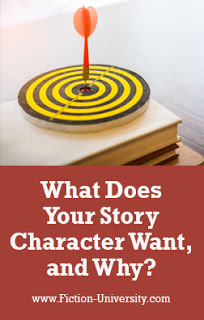 By Rayne Hall, @RayneHall
By Rayne Hall, @RayneHallPart of the Focus on Short Fiction Series
JH: Goals and motivations drive every story, but they're critical in a short story. Rayne Hall discusses character wants and needs and how they keep readers hooked.
Today, I want to share a professional trick for hooking readers from the start and keeping them hooked until your story's ending.
Give your main character a goal and an urgent reason to pursue it. Perhaps she wants to or win a prize in the village flower show, rescue her daughter from the kidnappers, get her suitor to propose marriage or raise money for her business.
Make this as important as possible: she doesn't just want it, she needs it. (I'll use the female pronoun in this article, but of course the main character in your story can also be male.) Give her a compelling reason (or better, several) for needing to achieve this.
Continue ReadingWritten by Janice Hardy. Fiction-University.com
Published on June 22, 2021 05:03
June 19, 2021
WIP Diagnostic: Is This Working? A Closer Look at a Historical Fiction First Page
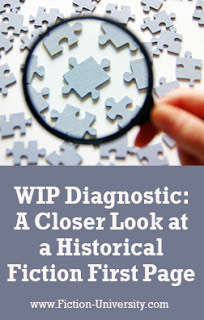 Critique by Maria D'Marco
Critique by Maria D'MarcoWIP Diagnostics is a weekly column that studies a snippet of a work in progress for specific issues. Readers are encouraged to send in work with questions, and we diagnose it on the site. It’s part critique, part example, and designed to help the submitter as well as anyone else having a similar problem.
If you're interested in submitting to WIP Diagnostics, please check out these guidelines.
Submissions currently in the queue: Five
Please Note: As of today, critique slots are booked through July 24.
This week’s question:
1. Based on the small portion of the novel I've provided, would you read further?
Market/Genre: Historical Fiction
On to the diagnosis…
Continue ReadingWritten by Janice Hardy. Fiction-University.com
Published on June 19, 2021 04:20




